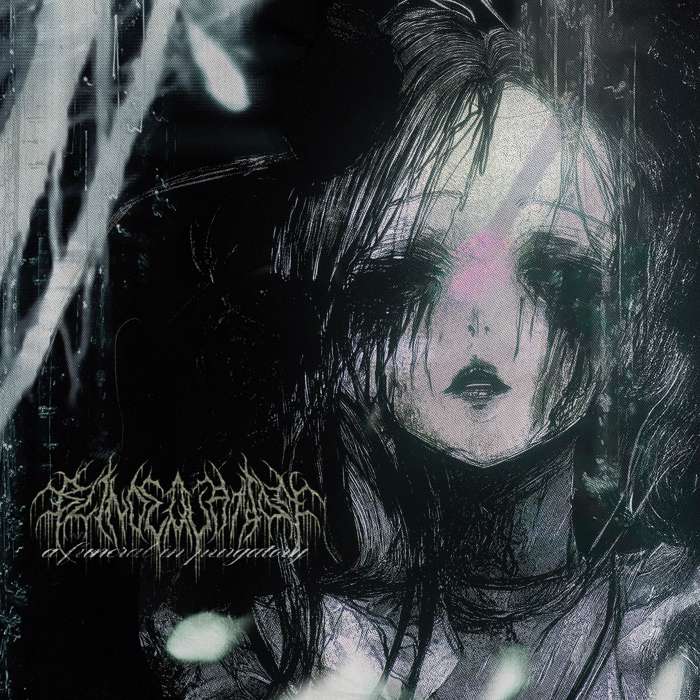Cybergrind. Polarizing, vague, and ever on the edge. The resurgence of the 90s birthed extreme, outsider genre has arguably received more attention in the last few years than it has in the combined total of its 30-odd years of existence. Its legitimacy continuously debated, its irreverence consistently dividing, its sound and artists both obsessively loved and fervently loathed, in 2025 the hyper-hybridized style is no less of a head scratcher. At the forefront of the 2020s cybergrind wave is Chicago, IL’s Blind Equation, heralding originally from the digital depths of 2013 Grindcore Karaoke. This summer marks the release of the band’s third full length record, and second album, titled A Funeral In Purgatory, with notorious springboard label and persistent innovators, Prosthetic Records. This new LP is a milestone for both the group itself as well as the experimental genre as a whole, marking a perfect evolution of Blind Equation’s creativity and a pinnacle work of the broader universe of digital, bedroom music.
Naysayers will try to dismiss Blind Equation’s work on A Funeral In Purgatory as being derivative of Horse the Band (as every act remotely near “nintendocore” is so frequently treated), or a so-called Myspace-era clone, and, of course, for its lack of “true-ness,” but I would suggest that as a very naive, short sighted stance. Blind Equation’s trajectory has shown a high degree of innovation and experimentation over its lifetime, carving out a distinct and original sound on the groundwork laid by underground digital metal projects of yore and core songwriter, James McHenry’s, years of rich experience playing, promoting, and producing in Chicago-area metal and hardcore scenes. A Funeral In Purgatory is not only a step forward for the general songwriting of McHenry, but shows a tasteful amalgamation of styles and attention to broader musical trends that is rarely found in other albums, let alone metal. Nintendocore, hyperop, metalcore, and electronic dance music all collide in Blind Equation’s most recent manifestation. A Funeral In Purgatory even features a clearly dungeon synth influenced interlude towards the end, and though some of the more extreme, grindcore-esque elements of the cybergrind are not as apparent this time around, it is supplemented by the album’s newfound degree of diverse audible palettes and a listenability that neither comes off as corny or forced; a worthy sacrifice. What was originally, and is relatively still, a niche within a subculture of internet music has managed to stay true to itself and its roots while expanding itself artistically and branching into a level of accessibility and relatability never before seen within the greater genre. This isn’t Ghengis Tron, this isn’t Agoraphobic Nosebleed, this isn’t Wecamewithbrokenteeth or iamerror, this is the phoenix-reborn and angel-given-wings of your older cousin’s weed smoking 2005 myspace era, something born tongue-in-cheek that has evolved so far beyond itself that its true original form is hard to discern within its contemporary identity. Blind Equation’s attentiveness to the movers and shakers of modern underground music and their influence is also made crystal clear on A Funeral In Purgatory, with two features from new-gen outsider music spearheads, Strawberry Hospital and JOHNNASCUS.
Most notably distinguishing itself from previous works, A Funeral In Purgatory displays a new degree of complexity in its songwriting, each track delivering a multifaceted sonic experience that spans metal and hardcore instrumental tropes turned up to 11, driving experimental electronics, and a well traversed spectrum of melodic and harsh moments with no dull instances. McHenry highlights a new scope of vocal abilities that is broader than any of his past releases and truly solidifies him as a genuine talent in the realm of frontman with a wide variety of highs, lows, and shouts, even branching into gutturals and singing. A Funeral In Purgatory also stands as the first time Blind Equation has ever employed guitars, adding a completely new dimension to the group’s overall sound, and breakdowns that could get anyone’s elbows up in the pit. Equally as important, the overall quality of production for the album sets a new standard for the band’s work, with their third LP delivering a fullness and richness unlike that of any of their prior material.
Bottom Line: A Funeral In Purgatory is a near 10-point record. It inspires a level of excitement and invigoration that is uncommon in many modern metal releases. It is consistent throughout and is increasingly enjoyable with every repeated listen. I’m confident in saying that it marks a pivotal point in extreme music and the overall future of sonic trends. A near masterpiece, like peering into the looking glass for what the next three to five years will bring in regards to how albums are made, influenced, and sound. An album that will enthrall or infuriate upon its release, like many great past albums have. Simultaneously true to its roots and ahead of its time, highly listenable, even poppy, yet visceral and gritty, archetypal but forward thinking, expertly balanced and juxtaposed. Not for everyone, but definitely for a far wider audience than this kind of music ever has been.
